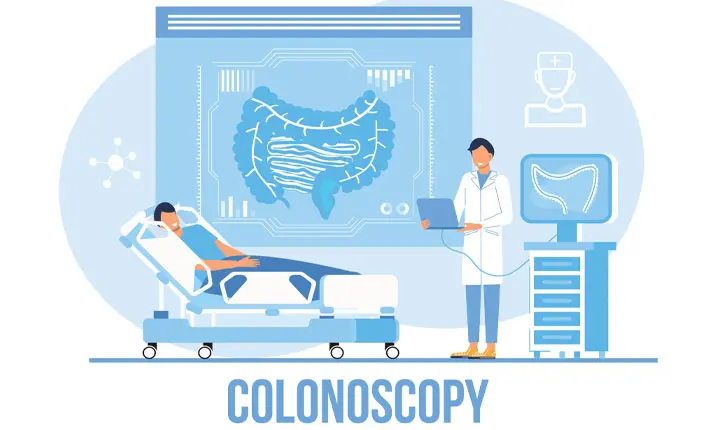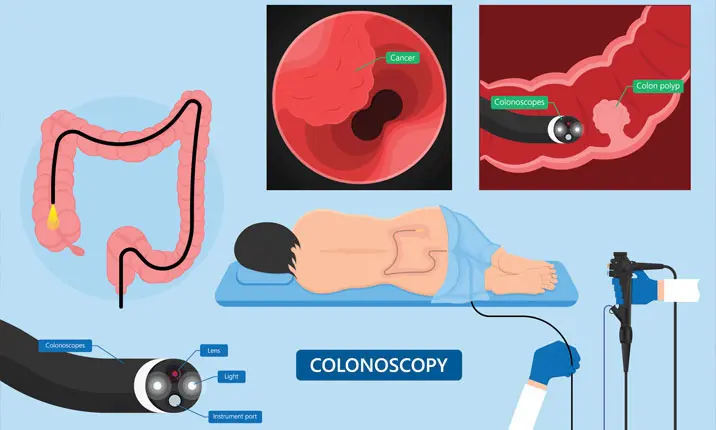Colorectal cancer is the most common cancer in Singapore. Early colorectal cancer may not come with any symptoms, and is thus difficult to detect without regular screening.
Early detection of colon cancer through screening methods such as colonoscopy can yield survival rates of up to 95%.
What is a colonoscopy?
A colonoscopy is a procedure which allows your doctor to visually check the lining of the colon without requiring any surgery. The colonoscope – a long and flexible tube carrying a small camera – is carefully inserted into the colon via the anus, relaying images to a screen and allowing doctors to check for problems along the entire length of the colon. The colonoscope is only around the size of a little finger, meaning that your doctor will be able to guide it easily and safely through the colon.
Is a colonoscopy painful?
Patients are usually given sedatives before a colonoscopy is performed. The sedative makes you feel sleepy so you won't be able to feel anything during the procedure.
You may feel some mild cramping after a colonoscopy if air was introduced into your bowel during the procedure. Additionally, there may be some mild discomfort the day after the colonoscopy if additional procedures, such as a biopsy, is performed.
How to prepare for a colonoscopy?
You will be required to undergo a strict diet of only clear liquids (water, apple juice, clear broths, etc.) for several days prior to the procedure. Your doctor will also provide you with a special laxative solution to be taken the day before the colonoscopy in order to clean out the colon and ensure that it is free of solid waste. Failure to adhere to this diet or take the solution would leave solid waste in the colon and your doctor might then be forced to reschedule the procedure.
You may also be required to take certain medications or refrain from others. Consult your doctor regarding your specific situation.
How is a colonoscopy performed?
During the procedure, the patient will be sedated and laid on the side with the knees tucked forward. Air is then used to slightly inflate the colon to straighten out the colon lining, allowing the doctor to carefully examine it with the colonoscope. This part of the procedure might take about half an hour, as the doctor will have to carefully navigate the colonoscope through the bends and twists in the colon in order to thoroughly examine every part.
The removal of any colon polyps, called a polypectomy, can also be performed at this stage. Additionally, a biopsy may be carried out, in which several small tissue samples are taken for further inspection under a microscope. This would allow your doctor to check for possible infections and inflammation. Such polypectomies and biopsies are usually painless and go unnoticed by the patient. Depending on what is required, the entire procedure may be significantly lengthened.
What are the risks of a colonoscopy?
After the procedure, it is not unusual for patients to experience some discomfort due to the air used to inflate the colon, but this tends to be slight and only temporary. Patients are often allowed to leave the hospital within a couple of hours. However, as it might take several more hours for the effects of the sedative to completely wear off, patients are usually advised to have someone accompany them home to rest for the rest of the day.
Some complications may arise if the patient responds poorly to the sedatives, but on the whole, colonoscopy is a safe procedure. If polypectomies or biopsies are performed, some bleeding might persist for several days after the procedure.
Under rare circumstances, the wall of the colon might get damaged during the colonoscopy and bleeding might result. Contact your doctor immediately if you experience vomiting, severe abdominal pains, fever or heavy bleeding as some cases could potentially be life-threatening.
Who needs a colonoscopy?
Because colon polyps take a long time to become cancerous, a routine colonoscopy every 10 years would help to prevent the vast majority of colon cancer cases, especially for people over the age of 50. Those who have a known history of polyps or colon cancer may be recommended by doctors to consider a more frequent routine.
Furthermore, your doctor might recommend a colonoscopy if you experience symptoms that suggest potential abnormalities in your colon. The symptoms can include blood in the stool, changes in bowel habits (constipation or diarrhoea), abnormal weight loss and abdominal pain. Colonoscopy screenings may also be recommended to check for inflammatory bowel diseases such as Crohn's disease or ulcerative colitis.
Do consult your doctor to assess your suitability for a colonoscopy screening.














